|
|
|
Sort Order |
|
|
|
Items / Page
|
|
|
|
|
|
|
| Srl | Item |
| 1 |
ID:
086315
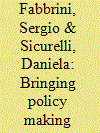

|
|
|
|
|
| Publication |
2008.
|
| Summary/Abstract |
While the major feature defining United States' (US) foreign policy since the Cold War has been the use of coercive means such as military power and economic sanctions, the European Union (EU) international role, despite recent attempts to develop military capabilities, remains that of a civilian power. The literature on transatlantic relations has explained this difference by stressing the different positions of the two actors in the international balance of power and pointing at their divergent value and normative frameworks. This article, by comparing the EU and US policy-making processes, introduces a further explanation. It argues that, although the two polities share the features of Compound Democracies, the different institutional organization of their foreign policy-making processes has generated powerful incentives for pursuing different kinds of international action.
|
|
|
|
|
|
|
|
|
|
|
|
|
|
|
|
| 2 |
ID:
121757
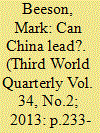

|
|
|
|
|
| Publication |
2013.
|
| Summary/Abstract |
The 'rise of China' is proving to be one of the most consequential developments of the early 21 century One of the key questions it raises is about the impact this historically unprecedented process will have on the East Asian region in particular and the world more generally. Will Chinese policy makers will be able to translate the country's growing material importance into other forms of political power and influence? Equally importantly, will Chinese elites be 'socialised' into the practices and norms of extant institutions, or will they attempt to redefine them to further Chinese foreign policy goals? This paper explores these questions by initially looking at the overall historical context in which East Asian regionalisation has occurred, before considering the operation of some of the more important regional institutions. It is suggested that China's ability to offer regional leadership is constrained both by its own security policies?which are seen as increasingly threatening by many of its neighbours?and by the actions of the USA, which is trying to reassert its own claims to regional leadership. While the outcome of this process is inconclusive, it helps us to understand the more general dynamics reshaping the international system as a result of the emergence of new centres of international power.
|
|
|
|
|
|
|
|
|
|
|
|
|
|
|
|
| 3 |
ID:
128115
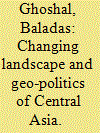

|
|
|
|
|
| Publication |
2013.
|
| Summary/Abstract |
The world may be witnessing a period of growing importance for Central Asia. It is a region where competing systems for international order are fully engages. it many will be the case that what transpires in Central Asia, i.e., competition between, international powers, will shape the future order in the region and indeed the world at large. One need not engage in far reaching geopolitical speculations regarding the future of Central Asia: it is already a political battleground for influence. This is more the sufficient reason to focus on the region to find out the emerging geopolitical trends and their implications for stability and order in the region.
|
|
|
|
|
|
|
|
|
|
|
|
|
|
|
|
| 4 |
ID:
133841
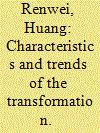

|
|
|
|
|
| Publication |
2014.
|
| Summary/Abstract |
The characteristics of the transformation of the contemporary international system are unprecedented since the birth of the Westphalian system, and even since the end of world war - II and cold war. The transformation of the contemporary international system is reflected firstly in the structural changes to international power, namely the transfer of power. The transfer of power and the transformation of the international order were accomplished through war throughout modern history
|
|
|
|
|
|
|
|
|
|
|
|
|
|
|
|
| 5 |
ID:
134008
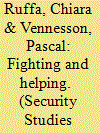

|
|
|
|
|
| Publication |
2014.
|
| Summary/Abstract |
In complex humanitarian emergencies, why are NGO-military relations cooperative in some cases, yet deeply conflictual in others? Drawing on historical-institutionalist theoretical insights, we argue that NGOs and military organizations are embedded in, and responding to, domestic institutional configurations that define a set of political incentives and constraints, material and normative, which structures and influences the characteristics and outcomes of their relations. Counterarguments suggest that organizational differences and the nature of their missions affect NGO-military relations. Using fresh empirical evidence we assess these arguments by comparing the Italian and the French experiences of NGO-military relations during the NATO-led International Security Assistance Force (ISAF) mission in Afghanistan and the UN mission in Lebanon (UNIFIL II) between 2007 and 2011.We find that domestic institutional configurations are not left behind when NGOs and military units deploy abroad. Rather, they shape NGOs' and militaries' capacity to work together instead of at cross purposes and ultimately influence the success of international action.
|
|
|
|
|
|
|
|
|
|
|
|
|
|
|
|
| 6 |
ID:
134007
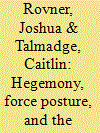

|
|
|
|
|
| Publication |
2014.
|
| Summary/Abstract |
International relations theories emphasize the stabilizing role hegemons play in world politics. But little scholarship has examined the link connecting hegemony to its potentially positive returns in the security realm: force posture. We correct this deficit by developing and testing an argument about the consequences of different hegemonic force postures under varying threat conditions. We present a typology of force posture options and probe their effects through over-time analysis of how major powers have worked to provide one particularly important public good since 1945: access to Persian Gulf oil. Drawing on field work, we also explore the implications of our framework for current and future US force posture in the region. We conclude that hegemonic stability is a very real phenomenon in the Gulf, but it does not require the massive forward deployment of US forces that has characterized the past twenty years of US presence there.
|
|
|
|
|
|
|
|
|
|
|
|
|
|
|
|
| 7 |
ID:
132119
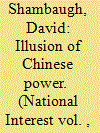

|
|
|
|
|
| Publication |
2014.
|
| Summary/Abstract |
CONVENTIONAL WISDOM has it that the China juggernaut is unstoppable and that the world must adjust to the reality of the Asian giant as a-perhaps the-major global power. A mini-industry of "China rise" prognosticators has emerged over the past decade, all painting a picture of a twenty-first-century world in which China is a dominant actor. This belief is understandable and widespread-but wrong.
|
|
|
|
|
|
|
|
|
|
|
|
|
|
|
|
| 8 |
ID:
132391
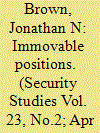

|
|
|
|
|
| Publication |
2014.
|
| Summary/Abstract |
Why might public acknowledgment of cooperative security negotiations generate bargaining constraints that provoke stalemate? Previous scholarship points to aroused public opinion. Yet in many cases where hard-line bargaining stances develop and talks collapse following public acknowledgment, it is not domestic political pressures that tie leaders' hands. This article examines instead an international constraint attendant to publicity: opposition by third-party states. I argue that international power position shapes the balance of vulnerability between the negotiating parties to abandonment and entanglement. The act of official acknowledgment can constrain the more vulnerable partner by enabling third-party states to credibly scrutinize its intentions. By threatening strained relations, such scrutiny can create a security dilemma that reduces the weaker partner's bargaining range to a choice between cooperation on its terms and noncooperation. I evaluate this argument by studying foreign military basing negotiations. Statistical analyses and a comparative case study produce strong support for my argument.
|
|
|
|
|
|
|
|
|
|
|
|
|
|
|
|
| 9 |
ID:
146814
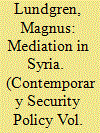

|
|
|
|
|
| Contents |
This article investigates mediation efforts in Syria from the outbreak of the civil war in 2011 through the spring of 2016. It describes the principal initiatives, analyses differences and similarities across mediators, and identifies strategic obstacles that prevented substantive progress. Focusing on mediation initiatives undertaken by the Arab League and the United Nations, it finds that there is considerable path dependence across efforts and that most of the limited achievements, notably ceasefires in 2012 and 2016, resulted from the application of external leverage. Settlement in Syria was conditioned on overcoming significant commitment problems, aggravated by sectarian mistrust, the fractured nature of the opposition, and international disunity. The article contributes the first review of mediation in Syria that comprehends the conflict in its entirety, systematizes data for research on conflict management, and evaluates existing mediation policy in Syria with an eye to the future.
|
|
|
|
|
|
|
|
|
|
|
|
|
|
|
|
| 10 |
ID:
089225
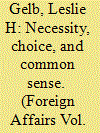

|
|
|
|
|
| Publication |
2009.
|
| Summary/Abstract |
The United States is declining as a nation and a world power, with mostly sighs and shrugs to mark this seismic event. Astonishingly, some people do not appear to realize that the situation is all that serious. A few say it is serious and hopeless. I count myself among those who think it is most serious yet reversible, if Americans are clear-eyed about the causes and courageous about implementing the cures.
|
|
|
|
|
|
|
|
|
|
|
|
|
|
|
|
| 11 |
ID:
133134
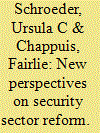

|
|
|
|
|
| Publication |
2014.
|
| Summary/Abstract |
This special issue identifies new directions in research on the consequences of international involvement in security sector reform (SSR). Both empirically and theoretically, the focus lies on the so far neglected role of local agency and domestic power constellations. The introductory article maps out different ways to analyse the external-domestic interaction dynamics that structure the often contentious and asymmetric encounters between international and local interests and demands in SSR processes. It makes the case for moving beyond a state-centric approach to the study of security governance in areas of limited statehood and for engaging more closely with the layered, mixed or hybrid security orders that can result from external engagement in domestic reform contexts.
|
|
|
|
|
|
|
|
|
|
|
|
|
|
|
|
| 12 |
ID:
106194
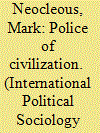

|
|
|
|
|
| Publication |
2011.
|
| Summary/Abstract |
This article deals with two contemporary issues: the return of "civilization" as a category of international power and the common refrain that war is now looking more and more like a police action. The article shows that these two issues are deeply connected. They have their roots in the historical connection between "civilization" and "police." Through an exercise the history of ideas as an essay in international political sociology, the article unravels the connection between these issues. In so doing, it suggests that a greater sensitivity to the broader police concept in the original police science might help us understand the war on terror as a civilizing offensive: as the violent conjunction of war and police.
|
|
|
|
|
|
|
|
|
|
|
|
|
|
|
|
| 13 |
ID:
172931
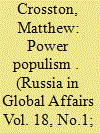

|
|
|
|
|
| Summary/Abstract |
In traditional understandings of classical populism, power is commonly
defined as being in need of devolving from the corridors of power and
out to a more grassroots foundation. At its core, populism was usually
seen as a belief in empowering regular people. ‘Regular people’ were
typically defined as being disconnected, if not outright disenfranchised,
from central power and outside the realm of the ‘elite.’ This paper
investigates the modern phenomenon in Russia and America that turns
these traditional concepts completely on their head. Rather than being
a movement engineered against elite political insiders, populism in
America and Russia currently seems to be occupied by the elites of
society. Ironically, these elites position themselves as the chosen
representatives of the disenfranchised. These strange bedfellows have
arguably produced a new form of ‘power populism’: instead of being
focused on removing power from the state, this populism is founded
more upon strengthening the global position of the state while tacitly
dismissing/attacking the perceived intellectual elite of each society.
|
|
|
|
|
|
|
|
|
|
|
|
|
|
|
|
| 14 |
ID:
133565


|
|
|
|
|
| Publication |
2014.
|
| Summary/Abstract |
The ascendancy of China has threatened the current hegemonic position of the United States. The US has responded by engaging deeper with countries in the region of Asia-Paci?c, strategically and economically. The Trans-Pacific Partnership is a part of the US. economic engagement in the region. Based on the realist theory of state action by Mastanduno et al, this paper argues that the Trans Paci?c Partnership is a natural strategy of the US. due to its international and domestic power position. TPP will bene?t the US. as a future trading template in Asia-Pacific.
|
|
|
|
|
|
|
|
|
|
|
|
|
|
|
|
| 15 |
ID:
120757
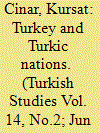

|
|
|
|
|
| Publication |
2013.
|
| Summary/Abstract |
Turkish foreign policy has experienced massive alterations after the end of Cold War. This has been most evident in Turkey's relations with Turkic nations in Central Asia and the Caucasus, all of which gained independence from the USSR. This article aims to provide a thorough analysis on this issue. First, the article explores the ethnicity concept and applies it to the relations between Turkey and Turkic nations. Then, it examines Turkey's relations with other regional and international powers, namely Russia, the USA, and Iran, through the lenses of Central Asia and the Caucasia. Finally, the article questions the often monolithic view of Turkic nations in the eyes of the Turkish public and delves into the rich yet diverse bilateral relations between Turkey and each Turkic state. To this end, it analyzes Turkey's political, economic, and cultural ties with Azerbaijan, Kazakhstan, Kyrgyzstan, Turkmenistan, and Uzbekistan. Carefully going over all of these subjects, the article intends to illustrate the multifaceted nature of Turkey's relations with Turkic nations and the prospects and obstacles ahead.
|
|
|
|
|
|
|
|
|
|
|
|
|
|
|
|
|
|
|
|
|